In the early part of the 20th century the Broadwell (Braddle) Wake was the highlight of the village calendar. August was ‘Wake’ month, when showmen with their caravans, roundabouts, coconut shies and all sorts of other amusements arrived in the Wake field.
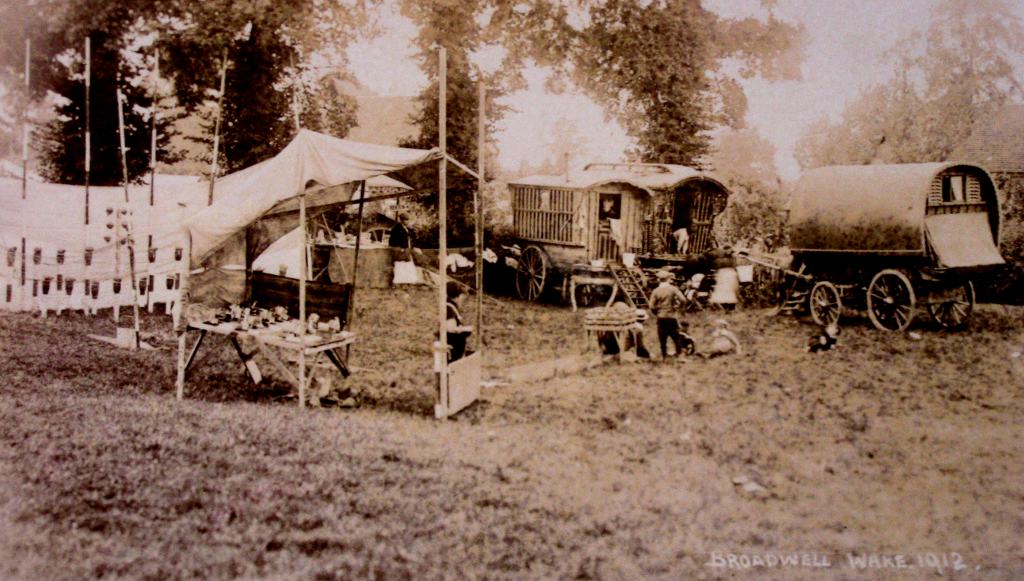
A marquee was erected for dancing to music by the Broadwell’s own Brass Band.
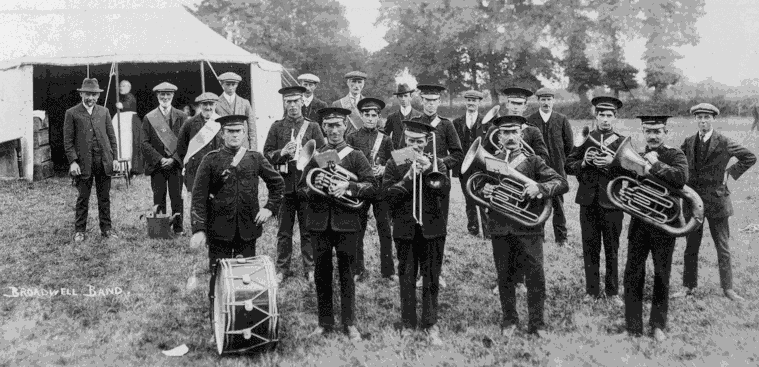
The event ended with a large meal for all to enjoy, the ladies having spent many days preparing the food including the special ‘Braddle Wake Pudding’, the recipe is below;
Braddle Wake Pudding
2 double handfuls of breadcrumbs
- 4 tablespoons of sugar
- 2-3 handfuls of currants or sultanas
- 3 eggs
- Milk to mix
- Nutmeg
- 1½ cups of pudding rice boiled in water
1 tablespoon of suet
Mix all dry ingredients together in a bowl
- Add some milk and leave to soften
- Beat the eggs and add to the mixture
- Put into a well greased tin and bake for 1½ hours at 150C-200C
Braddle Wake came to an end with the advent of World War 1.
Due to food shortages during 1914-1918 most, if not all, residents fed their families on home grown vegetables produced in their own gardens and many also rented an allotment.
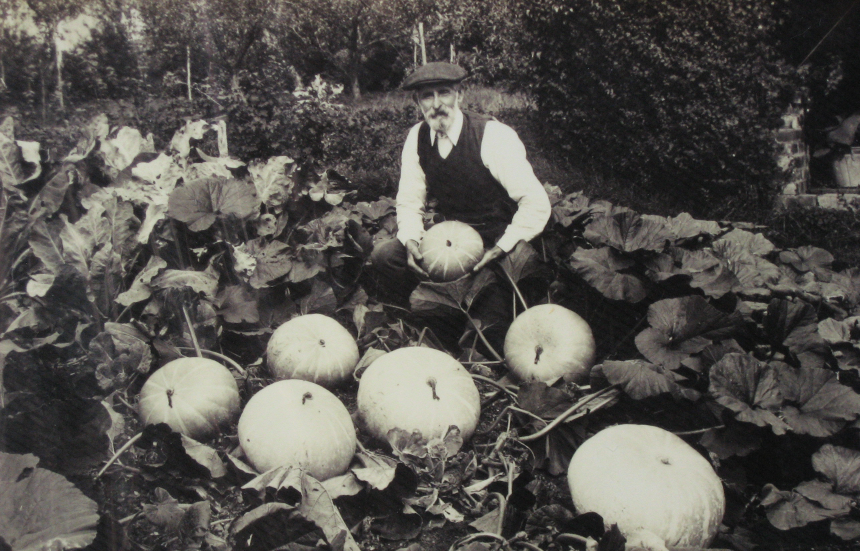
There was fierce competition to see who could grow the biggest and best produce and so the idea of holding a formal competition was discussed – hence the birth of Broadwell Flower Show.
The show, like the old Braddle Wake, was held in the Wake field, opposite The Row.

The Showmen with their caravans and amusements gave way to competitive sideshows, e.g. Bowling for a live pig (which would eventually help feed a family), skittles, hoop-la, spinning- jenny and roll-a-penny, all organised by the residents themselves.
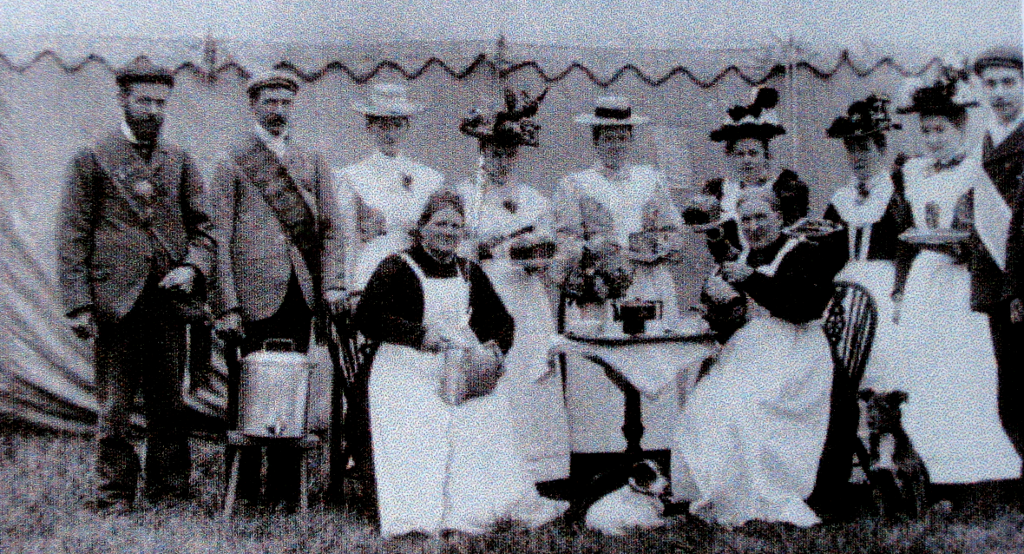
The show continued in much the same pattern until the outbreak of World War 2 (1939-1945) when it was suspended. It resumed in 1944 it and was again held in the Wake field. A fancy dress competition was introduced and Mr Owen of Birdingbury brought his miniature railway with steam engine and seats for children to ride on, although the track only ran in a small circle this was, of course, a great novelty and very popular.
Food still played a major part in the show but with rationing still in force it must have been quite difficult to cater for an unknown number of visitors, who at that time came from many parts of the British Isles specially for the occasion. A special permit was needed to obtain the bread and cakes required, which were supplied by Ways bakery at Stockton, with the remainder being donated by the ladies, who worked wonders with the small amounts that could be spared from their meagre rations.
As Children we were quite eager to eat the ends of the loaves of bread with a little home- made jam and, if you were lucky, perhaps a scraping of margarine - quite a treat in those days!
In 1946 the venue for the show was changed to the Village Green and it was around this time that farmer’s classes were introduced, including a class for a model hay-rick as well as cereal and root crops.
With more people now cooking with electricity the ladies cake class, the only class for ladies, became two classes – a cake cooked by coal fire and a cake cooked by electricity.
The only class for children at this time was for the best jam jar of wild flowers, which would, no doubt be frowned on today.
The Coventry electrical firm ‘Starlings’ provided music for the afternoon and for dancing in the marquee in the evening by means of a radiogram, carefully tended by Mr Brain, who after many years became a great friend of the show. Admission to the dance was 1 shilling and sixpence (7.5p in today’s money) for adults and nine pence (4p in today's money) for children.
In 1949 the show was cancelled due to severe dry weather conditions but the social and dance in the Victory Hall went ahead as planned.
Classes for the Best Kept Allotment and Kitchen Garden were introduced in the early 1950’s, with the prize money being two guineas (a guinea was £1 1shilling, or £1.05 in today’s money, for each class. Also at this time the first Spring Bulb Show was held and was a great success.
1951 was Festival of Britain Year, when towns and villages nationwide were asked to organise a special celebration event. Broadwell decided to make the Flower Show something special by holding a carnival. A Carnival Queen, four Attendants, two Flower Girls and a young boy to act as Crown Bearer were chosen. There were two fancy dress classes - traditional and comic, with prizes for various age groups, a beauty competition, an ankle competition and a comic cricket match

There was also an exhibition of old farm and garden implements. (Photographs of this and other shows are in the Victory Hall) This year the show moved to Mr Morgan’s field (now owned by Les Baldwin) and continued to be held there until 1958, when it returned to the Village Green.
The 1952 show again adopted the Carnival theme and although this was dropped in 1953 the adult and children’s fancy dress still continued.
Between 1953 and 1956 various extra classes were added to the schedule; eggs, jam, preserves, bottled fruit, a plated home-grown salad, children’s paintings and well after the restrictions of World War 2, classes for best dressed chickens (Oven ready) and home–made butter.
At one point when the same exhibitor won the cup several years in succession the committee decided that as he had a greenhouse it was unfair competition!
The 75th Anniversary, in 1994 was celebrated by including a Craft Fair in the programme and for this special occasion a Floral Queen was chosen, along with four attendants.

This was possibly the wettest day in the history of the Broadwell Show, making it inevitable that some events had to be altered but most went ahead as scheduled, including the Box Cart Race and notably the sale of our red telephone box.

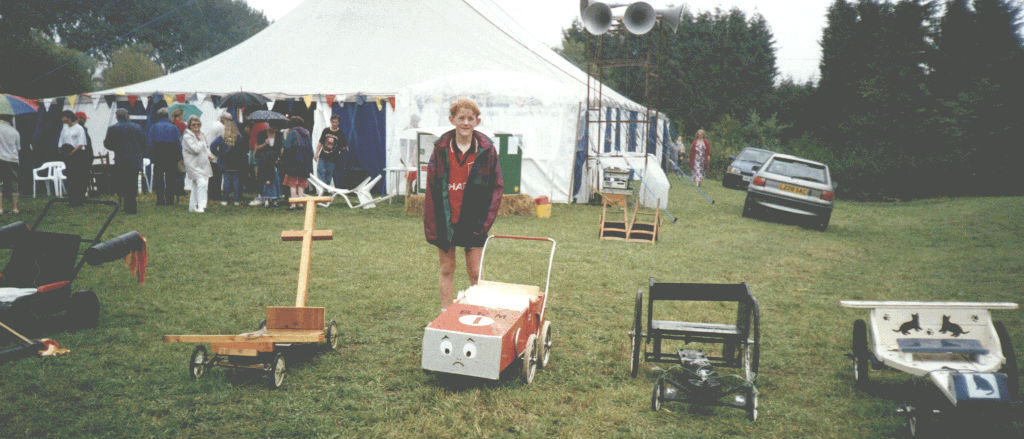

Over the years the show has altered but still it retains its own special village atmosphere. Many charities have benefited by donations made from the profits of the shows.